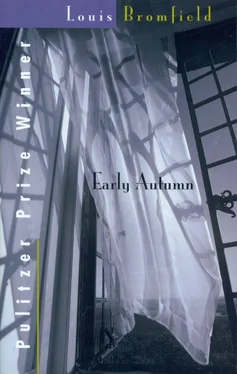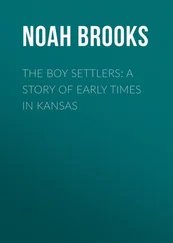As she moved across the meadow she noticed that the birches had begun to turn yellow and that in the low ground along the river the meadows were already painted gold and purple by masses of goldenrod and ironweed. With each step she seemed to grow weaker and weaker, and as she drew near the blue-black wall of pines she was seized by a violent trembling, as if the sense of his presence were able somehow to reach out and engulf her even before she saw him. She kept trying to think of the old man as he stood beside her at the hedge, but something stronger than her will made her see only Michael’s curly black head and blue eyes. She began even to pray … she (Olivia) who never prayed because the piety of Aunt Cassie and Anson and the Apostle to the Genteel stood always in her way.
And then, looking up, she saw him standing half-hidden among the lower pines, watching her. She began to run toward him, in terror lest her knees should give way and let her fall before she reached the shelter of the trees.
In the darkness of the thicket where the sun seldom penetrated, he put his arms about her and kissed her in a way he had never done before, and the action only increased her terror. She said nothing; she only wept quietly; and at last, when she had gained control of herself, she struggled free and said, “Don’t, Michael … please don’t … please.”
They sat on a fallen log and, still holding her hand, he asked, “What is it? What has happened?”
“Nothing. … I’m just tired.”
“Are you willing to come away with me? Now?” And in a low, warm voice, he added, “I’ll never let you be tired again … never.”
She did not answer him, because it seemed to her that what she had to tell him made all her actions in the past seem inexplicable and cheap. She was filled with shame, and tried to put off the moment when she must speak.
“I haven’t been down in three days,” he was saying, “because there’s been trouble in Boston which made it impossible. I’ve only slept an hour or two a night. They’ve been trying to do me in … some of the men I always trusted. They’ve been double-crossing me all along and I had to stay to fight them.”
He told her a long and complicated story of treachery, of money having been passed among men whom he had known and trusted always. He was sad and yet defiant, too, and filled with a desire to fight the thing to an end. She failed to understand the story; indeed she did not even hear much of it: she only knew that he was telling her everything, pouring out all his sadness and trouble to her as if she were the one person in all the world to whom he could tell such things.
And when he had finished he waited for a moment and then said, “And now I’m willing to chuck the whole dirty business and quit … to tell them all to go to hell.”
Quickly she answered, “No, you mustn’t do that. You can’t do that. A man like you, Michael, daren’t do such a thing.” For she knew that without a battle, life would mean nothing to him.
“No … I mean it. I’m ready to quit. I want you to go with me.”
She thought, “He says this … and yet he stayed three days and nights in Boston to fight!” She saw that he was not looking at her, but sitting with his head in his hands; there was something broken, almost pitiful, in his manner, and it occurred to her that perhaps for the first time he found all his life in a hopeless tangle. She thought, “If I had never known him, this might not have happened. He would have been able to fight without even thinking of me.”
Aloud she said, “I can’t do it, Michael. … It’s no use. I can’t.”
He looked up quickly, but before he could speak she placed her hand over his lips, saying, “Wait, Michael, let me talk first. Let me say what I’ve wanted to say for so long. … I’ve thought. … I’ve done nothing else but think day and night for the past three days. And it’s no good, Michael. … It’s no good. I’m forty years old today, and what can I give you that will make up for all you will lose? Why should you give up everything for me? No, I’ve nothing to offer. You can go back and fight and win. It’s what you like more than anything in the world … more than any woman … even me.”
Again he tried to speak, but she silenced him. “Oh, I know it’s true … what I say. And if I had you at such a price, you’d only hate me in the end. I couldn’t do it, Michael, because … because in the end, with men like you it’s work, it’s a career, which is first. … You couldn’t bear giving up. You couldn’t bear failure. … And in the end that’s right, as it should be. It’s what keeps the world going.”
He was watching her with a look of fascination in his eyes, and she knew—she was certain of it—that he had never been so much in love with her before; but she knew, too, from the shadow which crossed his face (it seemed to her that he almost winced) and because she knew him so well, that he recognized the truth of what she had said.
“It’s not true, Olivia. … You can’t go back on me now … just when I need you most.”
“I’d be betraying you, Michael, if I did the other thing. It’s not me you need half so much as the other thing. Oh, I know that I’m right. What you should have in the end is a young woman … a woman who will help you. It doesn’t matter very much whether you’re terribly in love with her or not … but a woman who can be your wife and bear your children and give dinner parties and help make of you the famous man you’ve always meant to be. You need someone who will help you to found a family, to fill your new house with children … someone who’ll help you and your children to take the place of families like ours who are at the end of things. No, Michael … I’m right. … Look at me,” she commanded suddenly. “Look at me and you’ll know that it’s not because I don’t love you.”
He was on his knees now, on the carpet of scented pine needles, his arms about her while she stroked the thick black hair with a kind of hysterical intensity.
“You don’t know what you’re saying, Olivia. It’s not true! It’s not true! I’d give up everything. … I don’t want the other thing. I’ll sell my farm and go away from here forever with you.”
“Yes, Michael, you think that today, just now … and tomorrow everything will be changed. That’s one of the mean tricks Nature plays us. It’s not so simple as that. We’re not like Higgins and … the kitchen maid … at least not in some ways.”
“Olivia … Olivia, do you love me enough to. …”
She knew what he meant to ask. She thought, “What does it matter? Why should I not, when I love him so? I should be harming no one … no one but myself.”
And then, abruptly, through the mist of tears she saw through an opening in the thicket a little procession crossing the meadows toward the big house at Pentlands. She saw it with a terrible, intense clarity … a little procession of the gardener and his helper carrying between them on a shutter a figure that lay limp and still, and following them came Higgins on foot, leading his horse and moving with the awkward rolling gait which afflicted him when his feet were on the ground. She knew who the still figure was. It was John Pentland. The red mare had killed him at last. And she heard him saying, “There are some things which people like us, Olivia, can’t do.”
What happened immediately afterward she was never able to remember very clearly. She found herself joining the little procession; she knew that Michael was with her, and that there could be no doubt of the tragedy. … John Pentland was dead, with his neck broken. He lay on the shutter, still and peaceful, the bitter lines all melted from the grim, stern face, as he had been when she came upon him in the library smelling of dogs and wood smoke and whiskey. Only this time he had escaped for good. …
Читать дальше












